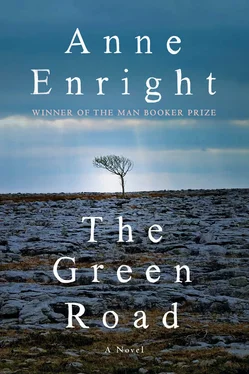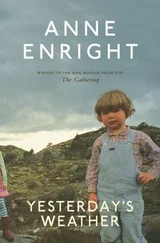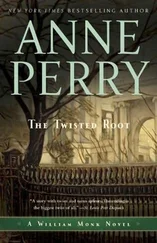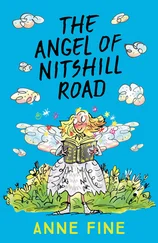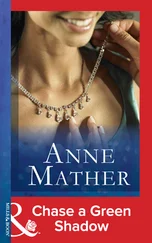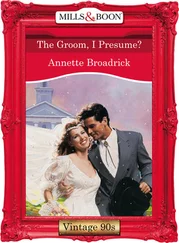Good question.
Oh the baby. The baby. Hanna loved the baby and did not want to doubt him even now, drunk as she was and dying on the kitchen floor. But she did sort of think that, if she did die, it would be the baby who had killed her. It would be that fat, strong boy, with his father’s ears and his father’s smile, and nothing of Hanna in him that she or anybody else could see.
Hanna rested her head, and did not try to move it again. She was happy enough where she was. There was no need to get up, just yet. She would stay, for just a few minutes more, between things.
There was a tickling in her hair, a cooling unpleasantness at the back of her neck. The blood was coming from her head.
Hanna didn’t sit down on the breaking bottle so much as crack her skull off something — the door of the press, perhaps — then break the bottle as she fell. If she put a hand to her head, she would feel an opening in her scalp, and inside it, her skull. The raw bone.
Hanna closed her eyes.
The kitchen floor tiles were new and she said to Hugh they were too shiny and too hard so everything would smash as soon as touch them, but Hugh wanted a kitchen that looked like an operating theatre or like a butcher’s shop, with steel and concrete and metal hooks hanging off metal bars. In a tiny little semi-detached. Hugh wanted a man kitchen. A serial murderer’s kitchen, with a row of knives pinned to a magnetic strip along the wall. Hugh cooked twice a year, that was the height of it. Every bowl and dish dragged out, the place covered in flour. The rest of the time he heated something up in the microwave or got in takeaway. Hugh was annoying and Hanna could not leave him. Not after she had died in the new kitchen, with the baby asleep upstairs.
But she was so cold, now, she got up to put something around her shoulders and she saw, as she rose, her body lying behind her on the floor, with blood browning on the tiles and then loosening around the broken bottle, where it was diluted with wine.
She would have to change her life. Again.
Hanna put her hand to her temple and felt the wound crusting under her hair. So much fucking blood. It did not seem possible. She felt light — gone, almost. She pawed her way along the counter, and lobbed the dishcloth on to the floor, then shoved the cloth about with her toe. Her life would have to change. Again.
Her life. Her life.
Upstairs the baby gave a strange, waking shout and Hanna stopped, waiting for the wails. But the baby didn’t cry. The dishcloth made a streak like a brushstroke across the floor: it looked like she was cleaning up blood. Then she remembered that it was blood. It was her blood. She looked over and Hugh was there, standing in the doorway, holding the baby.
‘What time is it?’ she said.
‘Sorry?’ said Hugh.
‘What’s the time?’
And the nice thing — she could not forget it. The nice thing, or the horrible thing, was the way the baby took one look at her and struggled to be in her arms.
She would not go to Casualty, Hanna said, and she would not go to bed, she would sleep sitting upright in an armchair, she would get the blood off her face, and it would be fine. This is what she told Hugh. She headed out past her boyfriend and her baby, and sat down on the stairs.
‘I am just going to the bathroom,’ she said, and she leaned her head against the bannister.
There were coloured lights outside the door, and before she knew it, the place was full of men. Ambulance men, huge and bizarrely light on their feet.
‘Jesus,’ she said.
The paramedic was pretty relaxed. He crouched below her on the stair.
‘What have we here,’ he said.
‘No,’ said Hanna.
‘Scalp,’ he said. ‘Oh, the scalp’s a fright.’
‘You are such a dick,’ Hanna said over his shoulder, to Hugh. ‘Why do you have to be such a fucking dick?’
‘Look at yourself,’ said Hugh, and he meant it literally. So Hanna looked down. She saw her T-shirt slicked on to her torso, the outline of her left breast perfectly stiff, like a sculpture of herself in dried blood.
The baby smiled.
And before she could refuse, they had her sitting up on a gurney, belted in. Before she could say, ‘Where’s my baby?’ the guy said, ‘He’ll be in first thing,’ and Hanna felt herself loosen and be relieved. Happiness slipped into her as she was pulled backwards up the ramp, and happiness tugged at her insides as the ambulance pulled silently away. All she lacked was a siren, to shout it. She was happy.
‘It’s a bit late for that, sweetheart,’ said the paramedic. ‘They’re all asleep in their beds.’
In Casualty, they cleaned her up and put her in a gown, and though they snipped and shaved her hair back from the wound, Hanna did not even need stitches in the end. She was left on the trolley to sleep and woke with a filthy headache, and no offer of pain relief. The trolley was in a corridor. The woman who came along to check and discharge her did not ask about post-natal depression and this was almost disappointing. (‘No, I’ve always had it,’ Hanna wanted to say, ‘I had it pre-natally. I think I had it in the womb.’) All the woman wanted to talk about was drinking — which Hanna thought was a bit obvious, given the circumstances. She was also quite condescending. But Hugh was calm by the time he arrived in with clean clothes and the baby, who had stopped smiling now and defaulted to his usual screams.
‘I think it’s a tooth.’
‘Did he sleep after? Did you put him down?’
In the car, they fought about the baby, and fell silent.
And that was it. For weeks, it was just, ‘Hanna cut her head,’ and once, when the buttons wouldn’t fasten on the babygro and Hanna thought she might actually throw the baby away from her, she might hit the baby against the wall, Hugh took over the buttoning and said, ‘See someone. Take a fucking pill.’
Meanwhile, he slept with her — he fell asleep in a normal way. And he also had sex with her — his erection was unaffected, that is, by the memory of Hanna encrusted in two pints of her own blackening ooze, and once he fuzzed his finger along the fine stubble around her wound and said, ‘Oh, my love.’ He reminded her to buy milk before he went out in the morning, and he mopped his butcher’s counters last thing at night. He looked after the baby all the hours that he was home, although he wasn’t home much. You could not accuse him of neglect.
Hugh was out at RTÉ working on a soap, which was brilliant — the work was brilliant, the soap was just a soap — but he was there all hours, talking to lighting and props, getting the right Ikea sideboard to set against a side wall. Once all that was settled in, he would be home at a regular time, but he was also doing drawings for a pocket Romeo and Juliet and hustling for a thing about Irish Mammies in the Olympia called Don’t Mind Me I’ll Sit In The Dark . Retro was where Hugh was at. Normal with an edge. ‘Just give me a litre of Magnolia matt emulsion,’ he liked to say. ‘And a place to stand.’
So Hugh was flat out. There was a mortgage to pay. Hanna pushed the buggy up to the Phoenix Park or along the quays into town and then she pushed it back to their little house in Mount Brown. Five kilometres to Stephen’s Green and back, ten kilometres the long way around the Park. Seven months after the birth, she was back in her skinny jeans, but what was the point of looking good, when no one cared? She went to an opening night at the Abbey and flirted like crazy, but it was as though no one found that relevant any more. Hanna drank, that evening, until she could not feel her arse sliding off the high stool. No one noticed that either. Not even her.
It was true that Hanna got pissed as soon as she left the baby, but it was also true that she never left the baby, or hardly ever. She mixed up vodka in a fruit juice bottle to bring on a girls’ night out and it was supposed to be a joke — the label said ‘Innocent’ — but she finished it on the way into town and didn’t tell them about it, when the moment came. Hanna could not face the girls and their talk of diets and auditions, bitching about the state of Irish theatre and the many shortcomings of their men. The girls did not have babies, or not yet. They were really jealous. They thought having a baby would solve something fundamental in their lives.
Читать дальше
